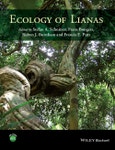Lianas are woody vines that were the focus of intense study by early ecologists, such as Darwin, who devoted an entire book to the natural history of climbing plants. Over the past quarter century, there has been a resurgence in the study of lianas, and liana are again recognized as important components of many forests, particularly in the tropics. The increasing amount of research on lianas has resulted in a fundamentally deeper understanding of liana ecology, evolution, and life-history, as well as the myriad roles lianas play in forest dynamics and functioning.
This book provides insight into the ecology and evolution of lianas, their anatomy, physiology, and natural history, their global abundance and distribution, and their wide-ranging effects on the myriad organisms that inhabit tropical and temperate forests.
Table of Contents
Contributors, vii
Foreword, xiii
Preface, xv
Acknowledgements, xvii
PART I INTRODUCTION, 1
1 The past, present, and potential future of liana ecology, 3
STEFAN A. SCHNITZER, FRANCIS E. PUTZ, FRANS BONGERS, AND KRISTINA KROENING
PART II PATTERNS OF LIANA DEMOGRAPHY AND DISTRIBUTION: FROM LOCAL TO GLOBAL, 11
2 Liana abundance and diversity in Cameroon’s Korup National Park, 13
DUNCAN THOMAS, ROBYN J. BURNHAM, GEORGE CHUYONG, DAVID KENFACK, AND MOSES NSANYI SAINGE
3 Dynamics of lianas in DR Congo, 23
FRANS BONGERS AND CORNEILLE E.N. EWANGO
4 Liana composition and diversity among tropical forest types of peninsular India, 36
NARAYANASWAMY PARTHASARATHY, S. MUTHURAMKUMAR, CHELLAMMUTHUMPERUMAL, P. VIVEK, N. AYYAPPAN, AND M. SRIDHAR REDDY
5 Diversity and distribution of lianas in Yasuní, Ecuador, 50
ROBYN J. BURNHAM AND HUGO G. ROMERO-SALTOS
6 Liana assemblage structure in four sites across the Brazilian Amazon, 65
ANSELMO NOGUEIRA, FLAVIA R.C. COSTA, MÁRCIA C. VILELA-SANTOS, CAROLINA V. CASTILHO, ANA ANDRADE, JOSÉ LUÍS C. CAMARGO, WILLIAM F. LAURANCE, AND ROBYN J. BURNHAM
7 The lianas of Barro Colorado Island, Panama, 76
STEFAN A. SCHNITZER, SCOTT A.MANGAN, AND STEPHEN P. HUBBELL
8 Diversity and distribution of lianas in Mexico, 91
GUILLERMO IBARRA-MANRÍQUEZ, PABLO CARRILLO-REYES, FRANCISCO JAVIER RENDÓN-SANDOVAL, AND GUADALUPE CORNEJO-TENORIO
9 Climbing plant diversity in Australia: taxonomy, biogeography and functional traits, 104
RACHAEL V. GALLAGHER
10 Patterns of liana succession in tropical forests, 116
SUSAN G. LETCHER
11 Biogeographical patterns of liana abundance and diversity, 131
SAARA J. DEWALT, STEFAN A. SCHNITZER, LUCIANA F. ALVES, FRANS BONGERS, ROBYN J. BURNHAM,
ZHIQUAN CAI,WALTER P. CARSON, JÉRÔME CHAVE, GEORGE B. CHUYONG, FLAVIA R. C. COSTA, CORNEILLE E. N. EWANGO, RACHAEL V. GALLAGHER, JEFFREY J. GERWING, ESTEBAN GORTAIRE AMEZCUA, TERESE HART, GUILLERMO IBARRA-MANRÍQUEZ, KALAN ICKES, DAVID KENFACK, SUSAN G. LETCHER, MANUEL J.MACÍA, JEAN-REMYMAKANA, AGUSTINA MALIZIA, MIGUEL MARTÍNEZ-RAMOS, JOSEPH MASCARO, CHELLAMMUTHUMPERUMAL, S. MUTHURAMKUMAR, ANSELMO NOGUEIRA, MARC P. E. PARREN, NARAYANASWAMY PARTHASARATHY, DIEGO R. PÉREZ-SALICRUP, FRANCIS E. PUTZ, HUGO G. ROMERO-SALTOS, M. SRIDHAR REDDY,MOSES NSANYI SAINGE, DUNCAN THOMAS, AND JULIANO VAN MELIS
PART III LIANA–TREE COMPETITION: COMMUNITY AND ECOSYSTEM LEVEL EFFECTS, 147
12 Above- and belowground competition between lianas and trees, 149
TARIN TOLEDO-ACEVES
13 Impacts of lianas on forest-level carbon storage and sequestration, 164
GEERTJEM.F. VAN DER HEIJDEN, OLIVER L. PHILLIPS, AND STEFAN A. SCHNITZER
14 Reciprocal interactions between lianas and forest soil, 175
JENNIFER S. POWERS
15 The role of lianas in temperate tree communities, 188
LAURAM. LADWIG AND SCOTT J.MEINERS
PART IV LIANA EVOLUTION, 203
16 Climbing plants in the fossil record: Paleozoic to present, 205
ROBYN J. BURNHAM
17 The evolution of angiosperm lianescence: a perspective from xylem structure-function, 221
SANDRINE ISNARD AND TAYLOR S. FEILD
18 Evolutionary implications of the climbing habit in plants, 239
ERNESTO GIANOLI
PART V LIANA ANATOMY, PHYSIOLOGY, AND BIOMECHANICS, 251
19 Liana anatomy: a broad perspective on structural evolution of the vascular system, 253
VERONICA ANGYALOSSY,MARCELO R. PACE, AND ANDRÉ C. LIMA
20 Physiological implications of the liana growth form, 288
LOUIS S. SANTIAGO, SARAH C. PASQUINI, AND MARK E. DE GUZMAN
21 Canopy chemistry expresses the life-history strategies of lianas and trees, 299
GREGORY P. ASNER AND ROBERTA E.MARTIN
22 Liana–nutrient relations, 309
MARIAN KAZDA
23 Stem biomechanics, strength of attachment, and developmental plasticity of vines and lianas, 323
NICK P. ROWE AND THOMAS SPECK
PART VI LIANA–ANIMAL INTERACTIONS, 343
24 Effects of lianas on canopy arthropod community structure, 345
STEPHEN P. YANOVIAK
25 Liana–bird relationships: a review, 362
NICOLE L.MICHEL,W. DOUGLAS ROBINSON, AND THOMAS W. SHERRY
26 Relationship between lianas and arboreal mammals: examining the Emmons–Gentry hypothesis, 398
THOMAS D. LAMBERT, ANDMICHAELA K. HALSEY
27 Use of lianas by primates: more than a food source, 407
VÍCTOR ARROYO-RODRÍGUEZ, NORBERTO ASENSIO, JACOB C. DUNN, JURGI CRISTÓBAL-AZKARATE, AND
ARTURO GONZALEZ-ZAMORA
PART VII LIANAS AND FOREST MANAGEMENT AND CONSERVATION, 427
28 Lianas as invasive species in North America, 429
STACEY A. LEICHT-YOUNG AND NOEL B. PAVLOVIC
29 Ecological effects of lianas in fragmented forests, 443
MASON CAMPBELL, WILLIAM F. LAURANCE, AND AINHOA MAGRACH
30 Increasing liana abundance in neotropical forests: causes and consequences, 451
STEFAN A. SCHNITZER
Index, 465








